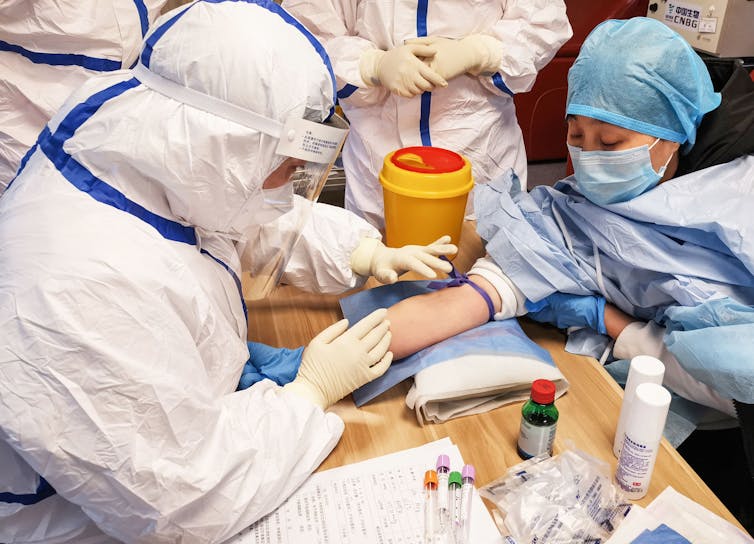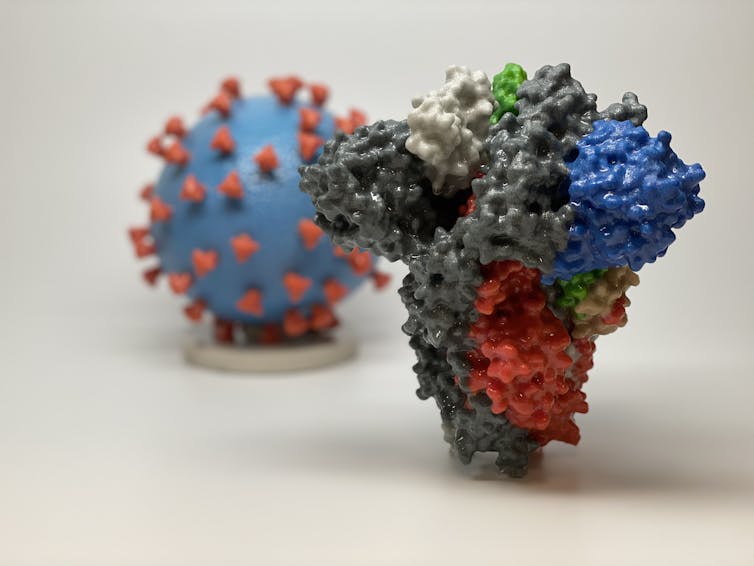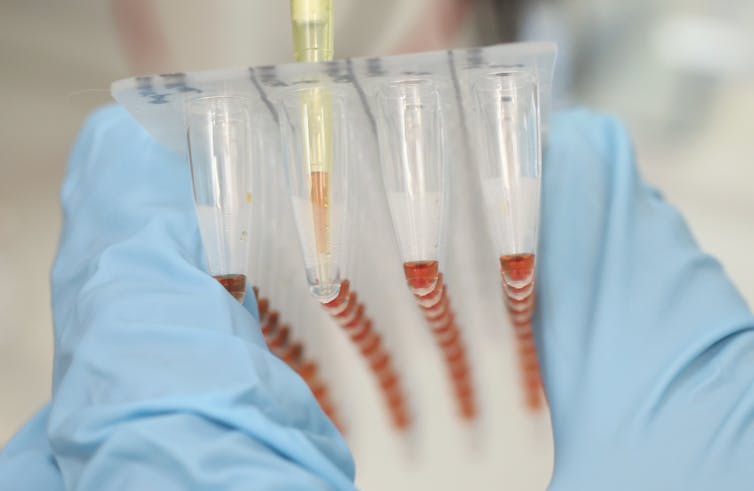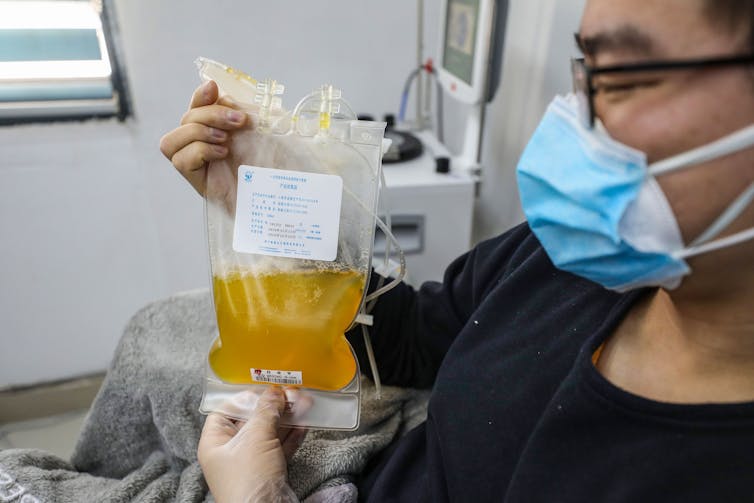Make the016.com a preferred choice with Google by clicking here 
 A person who has recovered from COVID-19 donates plasma in Shandong, China. STR/AFP via Getty Images
A person who has recovered from COVID-19 donates plasma in Shandong, China. STR/AFP via Getty Images
Ann Sheehy, College of the Holy Cross
Amid the chaos of an epidemic, those who survive a disease like COVID-19 carry within their bodies the secrets of an effective immune response. Virologists like me look to survivors for molecular clues that can provide a blueprint for the design of future treatments or even a vaccine.
Researchers are launching trials now that involve the transfusion of blood components from people who have recovered from COVID-19 to those who are sick or at high risk. Called “convalescent-plasma therapy,” this technique can work even without doctors knowing exactly what component of the blood may be beneficial.
For the pioneering work of the first treatment using therapeutic serum in 1891 (against diphtheria), Emil von Behring later earned the Nobel Prize in medicine. Anecdotal reporting of the therapy dates back as far as the devastating 1918-19 influenza pandemic, although scientists lack definitive evidence of its benefits during that global health crisis.
The extraordinary power of this passive immunization has traditionally been challenging to harness, primarily due to the difficulty of obtaining significant amounts of plasma from survivors. Due to scarce quantities, infusions of plasma pooled from volunteers were reserved for those most vulnerable to infection.
Fast forward to the 21st century, and the passive immunization picture changes considerably, thanks to steady advances in molecular medicine and new technologies that allow scientists to quickly characterize and scale up the production of the protective molecules.
The immune systems of COVID-19 survivors figured out how to combat and defeat the invading SARS-CoV-2 virus.
Neutralizing antibodies are one kind of immunological front-line response. These antibodies are proteins that are secreted by immune cells called B lymphocytes when they encounter an invader, such as a virus.
Antibodies recognize and bind proteins on the surface of virus particles. For each infection, the immune system designs antibodies that are highly specific for the particular invading pathogen.
 An enlarged 3D model of a single spike protein in the foreground; in the rear is a model of a SARS-CoV-2 virus covered with many of these spike proteins. NIH, CC BY
An enlarged 3D model of a single spike protein in the foreground; in the rear is a model of a SARS-CoV-2 virus covered with many of these spike proteins. NIH, CC BY
For instance, each SARS-CoV-2 virus is covered by distinctive spike proteins that it uses like keys to unlock the doors to the cells it infects. By targeting these spikes – imagine covering the grooves of a key with tape – antibodies can make it nearly impossible for the virus to break in to human cells. Scientists call these kind of antibodies “NAbs” because they neutralize the virus before it can gain entry.
A holy grail for vaccinologists is figuring out how to spark the production of these ingenious antibodies. On first infection, your B lymphocytes train themselves to become expert producers of NAbs; they develop a memory of what a particular invader looks like. If the same invader is ever detected again at any time, your veteran B lymphocytes (known as memory B cells by this stage) spring into action. They rapidly secrete large quantities of the potent NAbs, preventing a second illness.
Vaccines capitalize on this ability, safely provoking an immune response and then relying on the immune system’s memory to be able to fend off the real pathogen if you ever encounter it.
Passive immunization is a process in which neutralizing antibodies from one individual can be used to protect or treat another. A clever example of this process exploited by nature is breastmilk, which passes protective antibodies from the mother to the infant.
In addition to their potential preventative role, neutralizing antibodies are starting to prove beneficial in novel treatments for viral disease. Harnessing their protective power has been challenging, though, primarily because isolating enough antibodies to be effective is laborious.
Recent advances in the technology of molecular medicine at last allowed the kind of scale-up that enabled researchers to test the immunological principle. In 2014-15, Ebola virus disease surfaced in West Africa, triggering an epidemic that raged for over a year, killing more than 11,000 people. About 40% of those infected died. There were no treatments and no vaccine.
In the midst of the devastation came innovation: ZMapp, a mix of three synthetic NAbs showed early promising results in ameliorating disease in people infected with EBOV.
 Researchers inserted engineered DNA into plant leaves to produce antibodies to fight the Ebola virus. Sean Gallup/Getty Images News via Getty Images Europe
Researchers inserted engineered DNA into plant leaves to produce antibodies to fight the Ebola virus. Sean Gallup/Getty Images News via Getty Images Europe
By the time Ebola again emerged from the rainforest, this time in 2018 in the Democratic Republic of Congo, the science was ready. In November 2018, doctors launched three parallel trials comparing three different antibody cocktails. Nine months later, spectacular results allowed for an immediate end of the experimental trials so the cocktails could be used in the field.
While ZMapp did not work as well as anticipated, the trials identified two other antibody-based therapies from two different companies that did suppress Ebola symptoms in infected patients. The earlier in their infection that patients received therapy, the better the protection.
Infectious disease experts around the globe heralded the results as a vital breakthrough.
At that time last fall, it would have been difficult to imagine that within six months there’d be an even greater need for the powerful strategy of passive immunization.
 A doctor who has recovered from COVID-19 holds up a bag of his own donated plasma in Wuhan, China. STR/AFP via Getty Images
A doctor who has recovered from COVID-19 holds up a bag of his own donated plasma in Wuhan, China. STR/AFP via Getty Images
While the SARS-CoV-2 virus is moving quickly, with almost 1 million confirmed infections worldwide as of this writing, the science is racing to catch up.
Days ago a report published by scientists working in Shenzhen, China, suggested that plasma – which contains antibodies – from survivors of COVID-19 was successful in treating five critically ill patients. At the end of March, the FDA approved the use of convalescent plasma in treating severely ill people here in the U.S. In addition, Mt. Sinai in New York has established a collaboration with the FDA and other hospitals to begin clinical trials to scientifically determine whether this strategy of passive immunization is viable.
While the rapid move to evaluate this novel treatment is a moment for celebration, the science must keep moving. Convalescent plasma, which is isolated from recently recovered survivors, is in too short of a supply to be broadly useful. The most potent neutralizing antibodies must be quickly characterized and then produced efficiently in large quantities. Several companies, as well as a number of powerhouse academic labs, aim to meet the challenge of identifying and generating these life-saving NAbs.
At the fore is Regeneron, the pharmaceutical company that designed the effective Ebola treatment. Although targeting a different virus, their overall strategy remains the same. They’ve isolated and characterized NAbs and plan to engineer a cocktail of the most potent molecules. The viral target of these antibodies is the SARS-CoV-2 spike protein; the NAbs work by preventing the virus from entering cells.
Clinical trials are planned for early summer, essentially three months’ time. It is a breakneck pace for the development of such a sophisticated tool of intervention.
As the U.S. enters the exponential phase of COVID-19’s spread, this treatment cannot come soon enough.
[You need to understand the coronavirus pandemic, and we can help. Read our newsletter.]<!-- Below is The Conversation's page counter tag. Please DO NOT REMOVE. -->![]() <!-- End of code. If you don't see any code above, please get new code from the Advanced tab after you click the republish button. The page counter does not collect any personal data. More info: https://theconversation.com/republishing-guidelines -->
<!-- End of code. If you don't see any code above, please get new code from the Advanced tab after you click the republish button. The page counter does not collect any personal data. More info: https://theconversation.com/republishing-guidelines -->
Ann Sheehy, Professor of Biology, College of the Holy Cross
This article is republished from The Conversation under a Creative Commons license. Read the original article.
In The News
>WEATHER: Mark Rosenthal's 7-day forecast (:39). High of 40 today in Worcester
>TOP OF THE NEWS
-Worcester police S.W.A.T. team arrests man after armed domestic incident on Lawnfair Street
-Real estate developer Chip Norton sued by creditor who claims he owes $1 million
-Federal judge forces Worcester pastor Encarnacion into bankruptcy
-R.F.K. Jr. demands Dunkin', Starbucks prove drinks are "safe" (1:51). Article
-Radio Worcester (10:45): Vendors sought for Out to Lunch summer series on the Common
-Aislinn Doyle: March 5th School Committee meeting agenda preview
-Worcester considers cutting school busing distance to 1.5 miles
-Updated Worcester trash and recycling schedule through March 9th
>DINING OUT: Phantom Gourmet visits Worcester restaurant (5:05)
-ICYMI: Auburn police seek missing woman last seen in Florida over a month ago
-What you need to know: Worcester St. Patrick’s Parade ready to step off
-A.G. confirms lawsuit to follow Holden Town Meeting vote on housing law
-Holy Cross students keep community fed with fridge program (1:32)
-See the rest of the day's Worcester news
>HOLDEN (brought to you by Lamoureux Ford): Wachusett Echo: Debate over homework load continues at W.R.H.S.
-Winter snow brings great values at Lamoureux Ford (2:00)
-Wachusett Echo: The rewards and realities of A.P. classes at Wachusett
>THE BURBS (brought to you by North End Motor Sales): D.A. says foul play suspected after human remains found in Shirley
-Grafton Select Board approves increase to pay-as-you-throw bag fees
-Good deed by Gardner D.P.W. raises eyebrows on City Council
-$1 million lottery winner in Shrewsbury eyes investment, home buy
-Spencer selectmen hear more about FY'27 budget
-Police logs from Shrewsbury, Northborough and Westborough
>BARS & BANDS: The Mayor's Live Music List for Thursday
>SHOWTIME: Grace Givertz in the spotlight for Club 321 at Mechanics Hall
-Listen Up: Worcester's Many Kids Take Meds debuts new singles
-Discovering King Tut's Tomb exhibit coming to Boston (1:54)
>OPINION: Last Call: Rosa Fernandez, community health leader
-Tracey Faraday: Self-care station for your 2 a.m. feedings
-Radio Worcester Roundtable (48:00): Worcester police staffing crisis and $35 million Holden sewer lawsuit loss
>OBITUARIES: Tribute to past president of the Worcester Rotary Club
>SPORTS: Patriots to release Stefon Diggs in cost-saving move: Reports
-Mike Vrabel sparks A.J. Brown-to-Patriots trade speculation with latest comments
-Celtics lose to Hornets, 118-89 (2:04). Article
-Holy Cross women’s basketball completes 12-point fourth-quarter comeback against B.U.; secures No. 2 seed in Patriot League tournament
-Holy Cross women's hockey coach Katie Lachapelle named Hockey East Coach of the Year
-Holy Cross men’s basketball travels to No. 2 Lehigh for Patriot League quarterfinals
-South girls' hoops star Madison Leighton balances court, class, crisis
>NATIONAL: Iran launches new wave of attacks on Israeli and U.S. bases
-Father who gave gun to alleged school shooter is convicted of murder
-Tragic: Husband fatally shot wife and himself at hospital moments after welcoming their first child
>NEW ENGLAND: Providence diocese abuse report exposes decades of cover up
-Cash box with $1,000 stolen from Girl Scouts selling cookies in New Hampshire
>TRAVEL (brought to you by Fuller RV & Rental): Expedia's most affordable U.S. and abroad destinations for 2026
-The ultimate guide to solo travel confidence
>BUSINESS: 21 Attorneys General demand action from GoFundMe
-LPL Financial Research: How LPL Research thinks about dividends
-How long will it take to pay off your credit card?
>HOMES: Tips for snow and ice removal around your home
>HEALTH: Rates of rectal cancer rising, particularly among young people (1:59)
>FOOD: KFC revives beloved '90s menu item—but fans say something's missing
>TV/STREAMING: What is “Netflix After Dark”? Is the N.S.F.W. streaming category real?
>MOVIES: Trailer for "Peaky Blinders: The Immortal Man" (2:40)
>CELEBRITY: All the celebrities at Paris Fashion Week March
-Christina Applegate dumped Brad Pitt for '80s rocker: memoir
>ANIMALS: Orange cat outsmarts his entire household (1:52)
>HISTORY: Worcester County Wonders: The Worcester woman who refused to pay taxes
>GOOD NEWS: Years-old lottery numbers finally earn woman a $100,000 prize
-Meanwhile, world's smallest arcade machine is only .98 inch tall
Latest obituaries | | Wednesday's Highlights | | Today's horoscope | | Local Sports
Quick Links: Personalize your news | | Browse members | | Advertise | | Blogs | | Invite friends | | Videos
Animals | | Boston Sports | | Business | | Cars | | Celebrity | | Colleges | | Commute & Travel | | Crime | | Faith | | Food | | Good News | | Health | | Help Wanted | History | | Homes | | Local Sports | | Lottery | | Movies | | National | | New England | | Politics | | Shopping & Deals | | SHOWTIME! | | TV & Streaming | | Weather